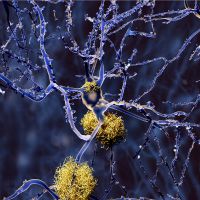Researchers have reported autopsy results, for the second time, that suggest that Alzheimer’s disease may be transmitted to people during certain medical treatments. These latest autopsies were conducted on the brains of seven people who died from Creutzfeld Jakob Disease (CJD). Decades previously, these seven people all had a procedure that involved surgical grafts of dura mater — the membrane that covers the brain and spinal cord. This involved taking a section of the dura – the membrane surrounding the brain – from a person who had recently passed away. These grafts were contaminated with the prion protein that causes CJD. However, in addition to the damage caused by the prions, in five out of the seven brains the researchers also discovered pathological signs associated with Alzheimer’s disease. Plaques formed from amyloid-β protein were discovered in the grey matter and blood vessels. The brains were from people aged between 28 and 63, which is unusually young to have developed such plaques. A set of 21 controls, who had not had surgical grafts of dura mater, but died of sporadic CJD at similar ages, did not have this amyloid signature. According to the researchers, transplanted dura mater may have been contaminated with small ‘seeds’ of amyloid-β protein, which some scientists believe could be a trigger for Alzheimer’s, along with the prion protein that gave them CJD. These results follow a study published in Nature2 last September, in which researchers from University College London reported that four of eight relatively young people, all of whom died as a result of CJD decades after receiving contaminated batches of growth hormone prepared from cadavers, also displayed amyloid plaques in the blood vessels and grey matter of their brains. Neither study implies that Alzheimer’s disease could ever be transmitted through normal contact with caretakers or family members, the researchers emphasize. However, the researchers say that if the theory of amyloid seeding turns out to be correct, it would have important clinical implications. For example, in general surgery, any amyloid-β proteins would not be routinely removed from surgical instruments as standard sterilization procedures cannot shift them.
Further Confirmation for ‘Transmissible Alzheimer’s’ Theory
Frontzek, K. et al. Swiss Med. Wkly 146 w1287 (2016).
Jaunmuktane, Z. et al. Nature 525, 247–250 (2015).
RELATED ARTICLES




